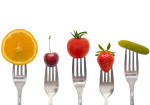|
2002/11/11, 02:52 PM
Hi Everyone,
I was wondering if someone could enlighten me as to how this works. Here is a hypothetical situation...
If my calorie requirements for one day are 3000 calories and I consume 4500, how long does it take for my body to convert the surplus calories to actual weight...either in muscle or fat?
I was also wondering could the effects of eating the surplus calories be negated by subtracting the same amount of calories out of the next day's requirements?
|
|
|
|
2002/11/11, 03:35 PM
to answer your first question: there are a lot of variables contributing to that, including genetics. generally speaking - fat is stored, muscle is constructed. so muscle gains CAN materialize slower than fat storage. but, again, it's dependent on many things.
second question: NO! this is a huge misconception (along with the belief that extra cardio can make up for bad diet choices) perpetuated by arm chair health gurus. your body does not function on reason, but on reaction. it is a basic, nature-driven machine. it functions on the premise that if your body needs it, it will use it. if not, your body will store it or send it on its way as waste. you can not forcast your caloric intake days ahead without taking into account your caloric expendentures as well.
hope this helps........
--------------
Michael
"Trample the weak; hurdle the dead!"
|
|
2002/11/11, 07:39 PM
Thanks for the response rev8 ...LOL...on the lighter side I guess I'll have to carefully watch my intake on those upcoming 4500 calorie holiday eating days...and not overdo it.
|
|
2002/11/11, 07:40 PM
Message deleted by moderator due to unsuitable content for this board.
|
|
2002/11/11, 09:22 PM
So much depends on the type of calories consumed. All calories are not created equal. You can eat a twinkie which may be 200 calories(just throwing a number out), or you can eat a 6 oz. chicken breast,baked sweet potato, and 2 cups of vegetables that amount to many more calories. Which are you going to benefit from the most? Even though the second "meal" has many more calories, much more beneficial. The way those calories are used are as needed by the body. If you need fuel, the carbohydrates will be converted to glycogen. When glycogen stores are full, there is a good chance fatty tissue will be developed. If a good portion is protein, and you have beeen working out hard, and all other bodily requirements are met, muscle tissue can be developed. One word of caution, the fatty tissue will show much faster than the muscle tissue. Juat a little added "food" (sorry for the pun), for thought. And, as REV said, each and every meal is an entity in itself. You cannot negate a bad meal with a good one or skip a meal to make up some of the calories. Great question.
|




